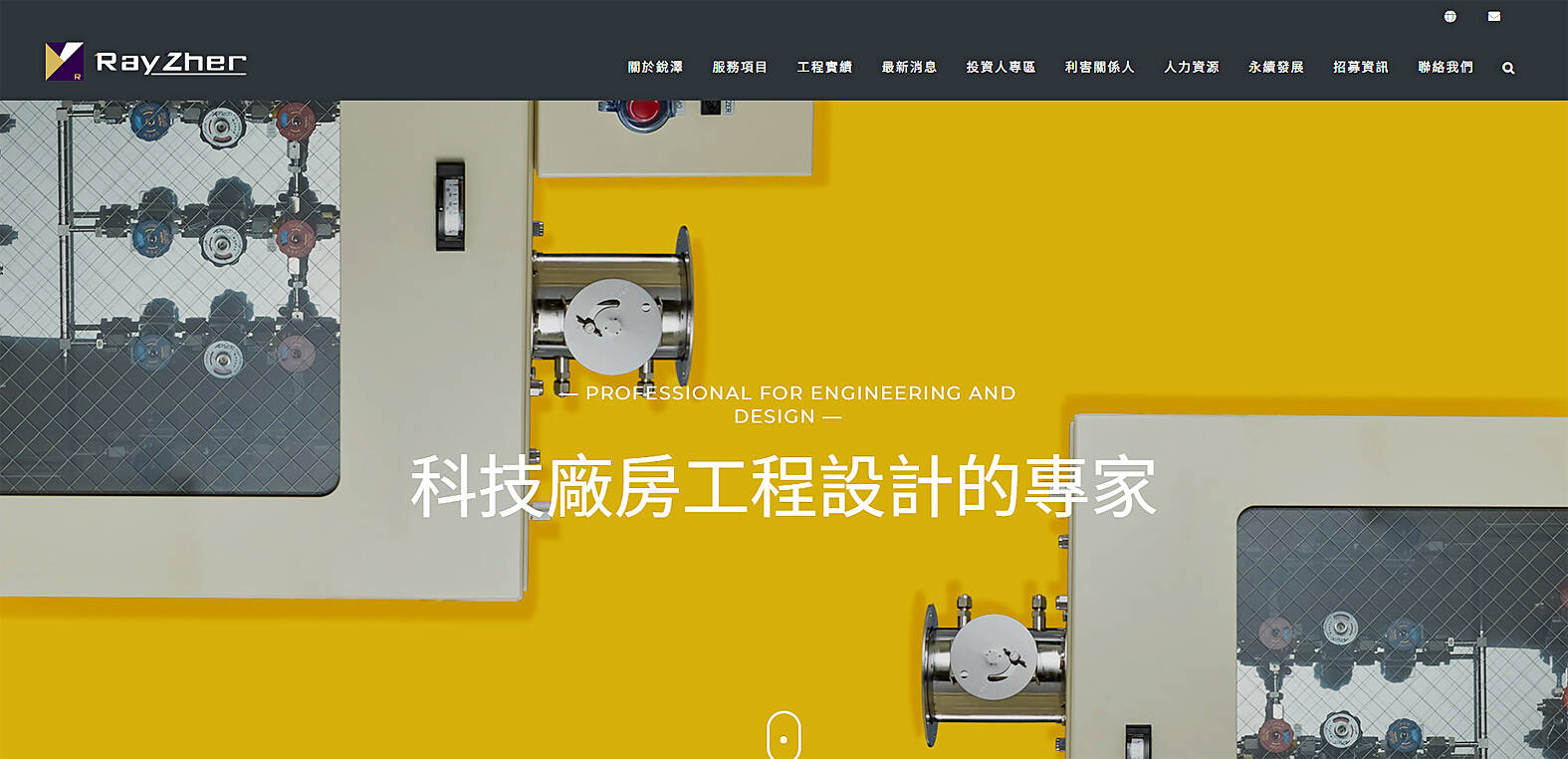Rayzher Industrial Co (銳澤), which specializes in installing mains systems and gas pipelines to transmit utilities for semiconductor manufacturers, yesterday said it has formed a strategic partnership with Japan’s Crest Technologies Co as it seeks to enhance overseas operations to expand revenue.
Rayzher last year set up a new Japanese unit, following in the footsteps of key customer Taiwan Semiconductor Manufacturing Co (台積電), which plans to build a second plant in Kumamoto later this year to produce chips made with 6-nanometer process technology after the first fab entered volume operation last year.
Based in Hsinchu County’s Jhubei City (竹北), Rayzher also counts US-based Micron Technology Inc and Taiwan’s Vanguard International Semiconductor Corp (世界先進) among its customers.

Photo: Screen grab from Rayzher Industrial Co’s Web site
To fund its rapidly expanding business, Rayzher’s Japanese unit launched a rights issue to more than double its share capital to ¥200 million (US$1.4 million) from ¥76 million.
Crest has subscribed to some of the newly issued shares and secured a 20 percent stake in Rayzher’s Japanese unit, Rayzher said in a statement.
The collaboration with Crest would help boost Rayzher’s service capacity in Japan, and boost its support for customers from Taiwan and for Japanese customers with manufacturing facilities in the country, the statement said.
Additionally, Rayzher expects to leverage Crest’s experienced engineering teams and close connections with local customers to help it secure more projects targeting high-technology manufacturing facilities in Japan.
Crest, based in Nagoya, specializes in the maintenance of industrial machinery and production facilities, the company’s Web site says.
Rayhzer would team up with Crest to help customers install submain systems and industrial process gas piping systems connecting plant equipment to process equipment, as well as providing turnkey solutions, the statement said.
The submain systems include gas supply equipment such as gas chromatography devices, valve manifold boxes and purification gas systems.
With the partnership, Rayhzer aims to shore up its revenue from overseas expansions, the company said.
The company has said that most Taiwanese firms are facing challenges sourcing skilled engineering talent when expanding overseas.
Rayzher is banking on the resources of its parent company, Acter Group Co (聖暉), to expand its business in Southeast Asia, where Acter has built a strong presence.
In Japan, Rayzher’s strategy is to team up with local electric equipment service providers, it said.
Rayzher is in the process of setting up a US unit after launching a Singaporean unit last year, following in customers’ footsteps for expanding global deployment.

Taiwan’s rapidly aging population is fueling a sharp increase in homes occupied solely by elderly people, a trend that is reshaping the nation’s housing market and social fabric, real-estate brokers said yesterday. About 850,000 residences were occupied by elderly people in the first quarter, including 655,000 that housed only one resident, the Ministry of the Interior said. The figures have nearly doubled from a decade earlier, Great Home Realty Co (大家房屋) said, as people aged 65 and older now make up 20.8 percent of the population. “The so-called silver tsunami represents more than just a demographic shift — it could fundamentally redefine the

Businesses across the global semiconductor supply chain are bracing themselves for disruptions from an escalating trade war, after China imposed curbs on rare earth mineral exports and the US responded with additional tariffs and restrictions on software sales to the Asian nation. China’s restrictions, the most targeted move yet to limit supplies of rare earth materials, represent the first major attempt by Beijing to exercise long-arm jurisdiction over foreign companies to target the semiconductor industry, threatening to stall the chips powering the artificial intelligence (AI) boom. They prompted US President Donald Trump on Friday to announce that he would impose an additional

China Airlines Ltd (CAL, 中華航空) said it expects peak season effects in the fourth quarter to continue to boost demand for passenger flights and cargo services, after reporting its second-highest-ever September sales on Monday. The carrier said it posted NT$15.88 billion (US$517 million) in consolidated sales last month, trailing only September last year’s NT$16.01 billion. Last month, CAL generated NT$8.77 billion from its passenger flights and NT$5.37 billion from cargo services, it said. In the first nine months of this year, the carrier posted NT$154.93 billion in cumulative sales, up 2.62 percent from a year earlier, marking the second-highest level for the January-September

Asian e-commerce giant Shein’s (希音) decision to set up shop in a historic Parisian department store has ruffled feathers in the fashion capital. Anger has been boiling since Shein announced last week that it would open its first permanent physical store next month at BHV Marais, an iconic building that has stood across from Paris City Hall since 1856. The move prompted some French brands to announce they would leave BHV Marais, but the department store had already been losing tenants over late payments. Aime cosmetics line cofounder Mathilde Lacombe, whose brand was among those that decided to leave following